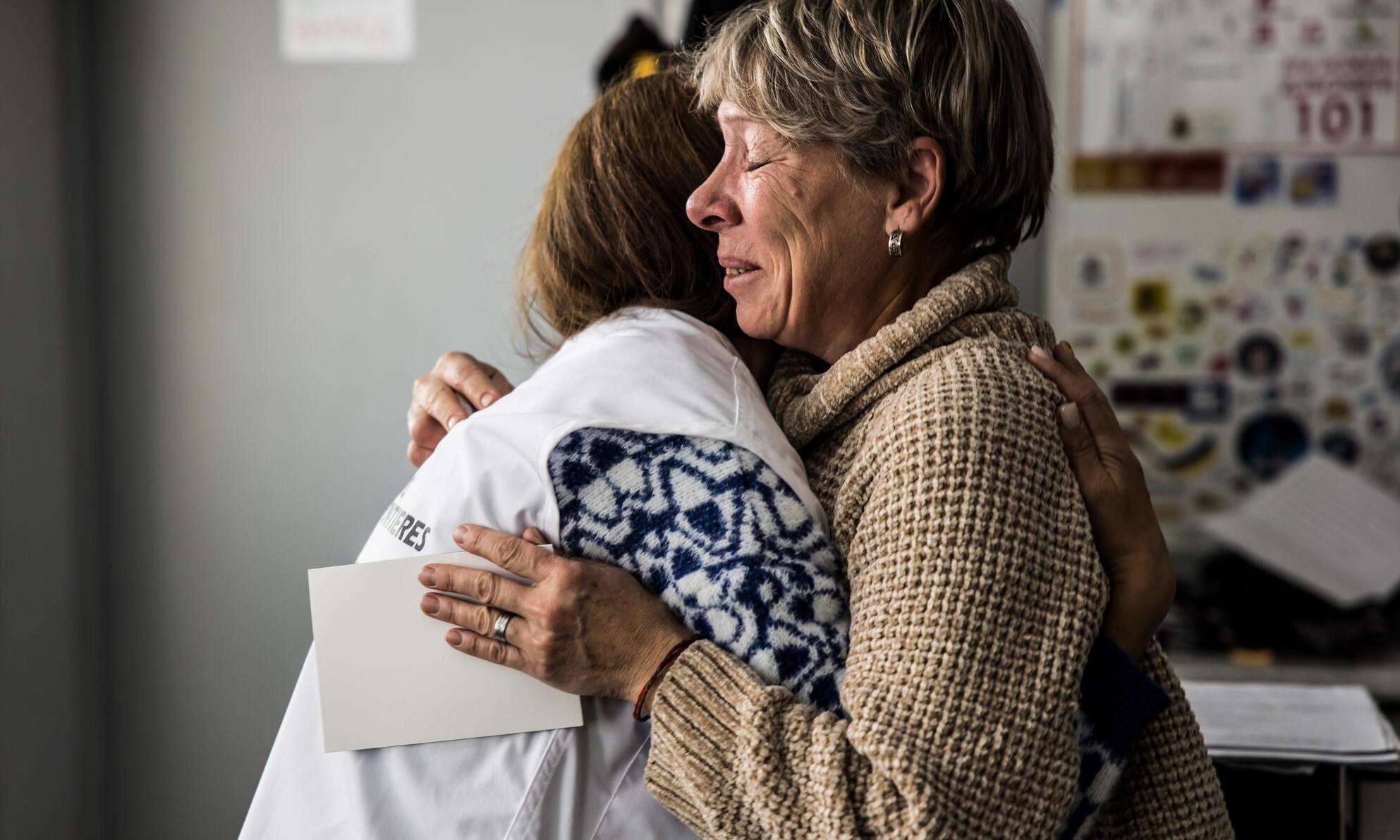When the war in Ukraine escalated in 2022, Trostianets was one of the first towns to be occupied by Russian troops. During its two months under occupation, most of the departments at Trostianets Hospital were moved underground, into labyrinthine rooms rigged with electricity and basic supplies. Then the building was severely damaged.
“There were holes from [gun]shots that pierced the whole building,” said Anna Svesova, the director of Trostianets Hospital. “You could see the sky through them. It was very hard. But we survived."
After the Ukrainian government regained control of Trostianets, Doctors Without Borders/Médecins Sans Frontières (MSF) helped renovate the hospital in 2023. This spring, however, shelling has increased significantly in the northeastern region of Sumy, where Trostianets is located, and a blast from a nearby shell damaged the hospital again. The medical facility lost 184 windows, but all seven departments were up and running four days after the attack.
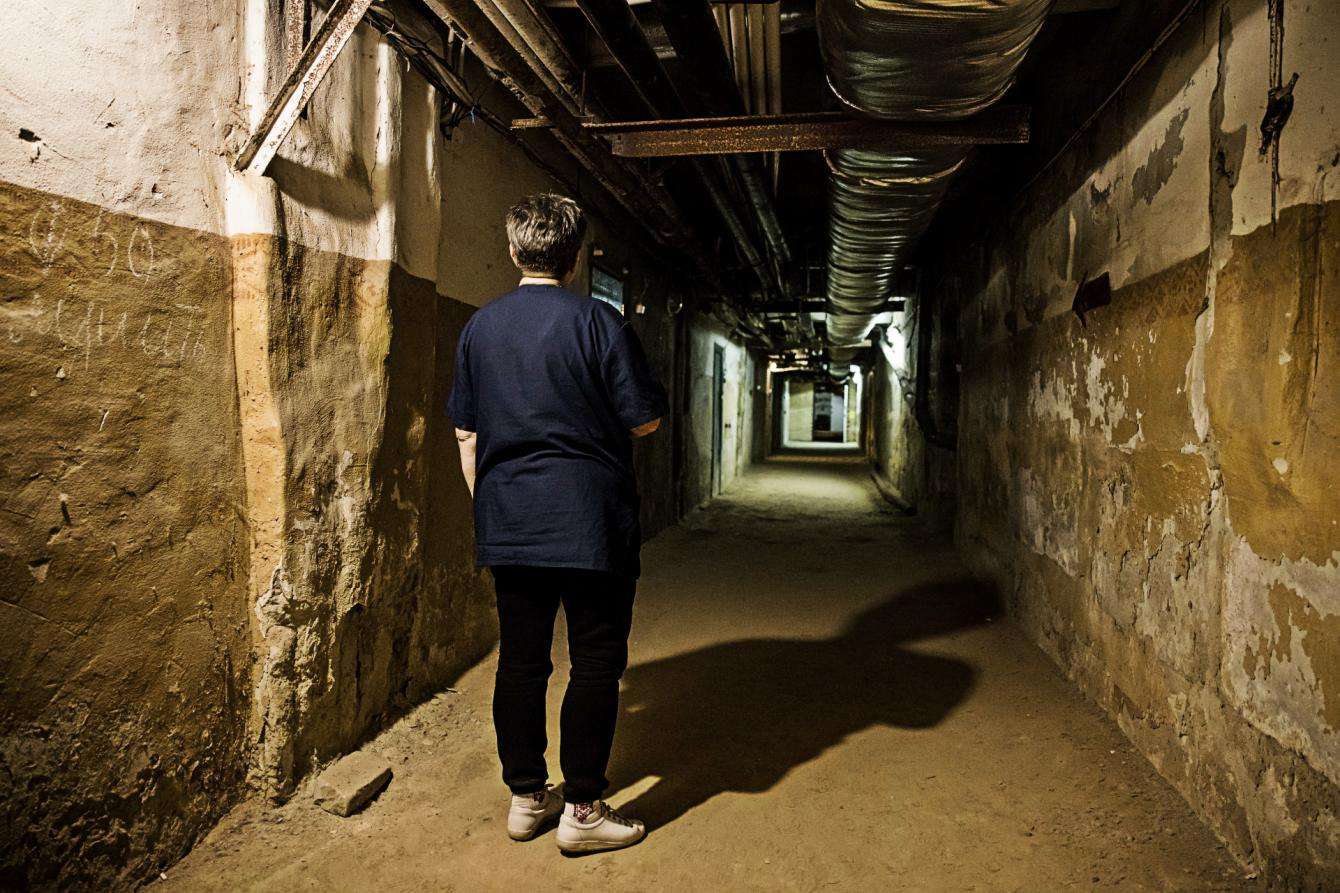
The emotional toll on health workers
The constant bombardment of frontline areas in the east, south, and northeastern parts of Ukraine takes a toll on the mental health of not only patients but health workers. That’s why MSF's mental health program, which is a key component of our response to the war in Ukraine, includes helping the staff of Trostianets Hospital cope with the horrors of war through sessions held by MSF psychologists. These activities are also carried out in other regions of Ukraine close to the front lines, such as Donetsk and Kharkiv, where Ministry of Health doctors respond to emergencies including mass casualties following attacks by missiles or shelling.
"In the first phase of the war, state doctors and psychologists worked themselves to exhaustion,” said Alisa Kushnirova, who supervises a team of MSF psychologists working in the Kherson, Mykolaiv, and Kirovohrad regions. “No one thought about taking care of themselves and their mental health, so people were exhausted and burned out. That's why MSF launched a project to provide psychological support to the medical staff—to guarantee care for caretakers in the hospitals we support.”
In a series of group and individual sessions, MSF psychologists help the doctors develop mechanisms for recovery and rest, work through personal concerns, and—most importantly—learn not to suppress their emotions.
"The psyche is like a sponge: it absorbs all the information from patients, but it cannot process and squeeze it all out on its own, so if you want to cry and scream, you have to do it,” said Kushnirova. “This may be perceived as a weakness, but the ability to recognize and release such emotions is a great strength."
Throughout Ukraine, MSF psychologists deliver psychological support tailored to patients' needs. In 2022 and 2023 alone, we provided 26,324 individual consultations for mental health. Some were held in mobile clinics, through which people in areas retaken by the Ukrainian army and in villages close to hostilities in the Kherson, Donetsk, Mykolaiv, and Kharkiv regions can access medical and psychological care.
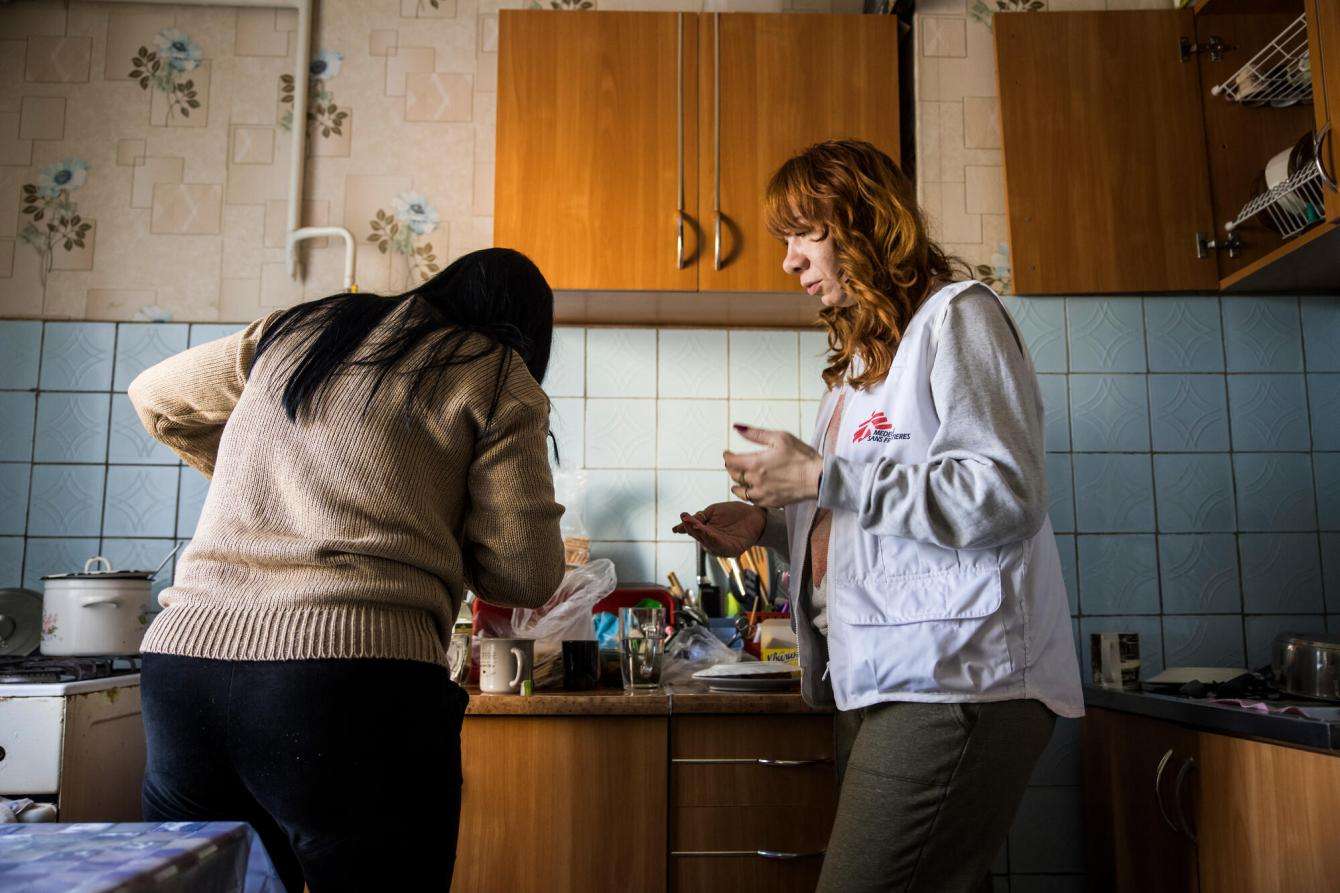
Prioritizing mental health
An unstable mental state not only comes with emotional pain but can also affect people’s physical health no matter their age. Older people are more likely to face insomnia and cardiovascular disease, while middle-aged and young people are more likely to experience headaches, hormonal problems, and irregular menstrual cycles. The war has also had a negative impact on children's cognitive abilities, leading to developmental delays, speech problems, nightmares, and enuresis, which have become common. Some patients develop post-traumatic stress disorder (PTSD) and suicidal thoughts.
Sometimes people do not see their mental health as a priority when their basic needs for clean water, food, health care, and utilities are not met. In some areas, there are no medical facilities because they have been destroyed, and there is no medical staff. Elderly people in these regions are particularly affected, as they are often unable to leave the area due to mobility challenges. The constant worry can aggravate other health problems, such as cardiovascular disease and insomnia.
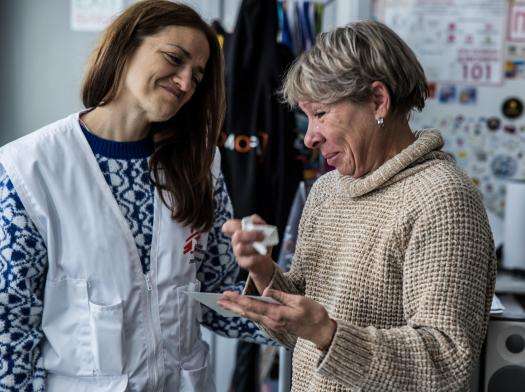
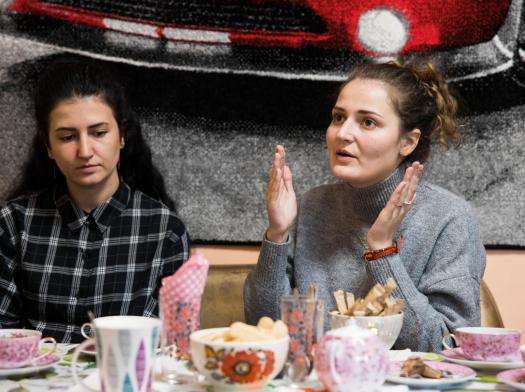
MSF mental health activities include group sessions for women who have lost husbands or sons in the fighting. Ukraine 2023 © Nuria Lopez Torres
In mobile clinics, MSF psychologists often explain to patients the importance of mental health and the impact it has on the quality of their lives. They advise patients on how to improve sleep quality, manage anxiety and tension, and conduct psycho-educational training for communities on how to deal with stress. Basic techniques and support for mental health can help stabilize a patient's emotional state and prevent the onset of cardiovascular disease and mental disorders.
More complex cases can require long-term work. For instance, in October 2023 MSF psychologists provided psychological support to the survivors of a missile attack on a café in the village of Hroza in Kharkiv, in which 15 families out of the village's 330 residents lost loved ones, according to the authorities and the UN.
"After [those] wounded in this attack were taken to hospital, our psychologists worked with them,” says Victoria Lepekha, a mental health supervisor with MSF. “There were six people with serious injuries, some of them in the head, with impaired brain activity and speech. They all lost their families [...] People who are experiencing acute grief all need support, [someone] to listen to them, to sympathize with them, to hold their hands, even to cry with them.”
Long-term support is crucial to the successful recovery of patients experiencing grief and loss. In the Kharkiv region, for example, MSF provided group counseling for seven women who had lost their husbands or sons at the front line. This group of women has met at least 10 times since August 2023 to discuss their experiences, pain, and their thoughts about the war.
One of them is Natalia Rukhova, who is originally from Pervomaiske and lost her son in the war. As she shared her feelings during a session, she started crying. "No one knows when [the war] will end and how long we will have to wait. I am afraid that when it is over, the situation will be terrible and the psychological state of young and old will be terrible. People have lost a lot and now they have nothing. I do not know how we can bear it.”
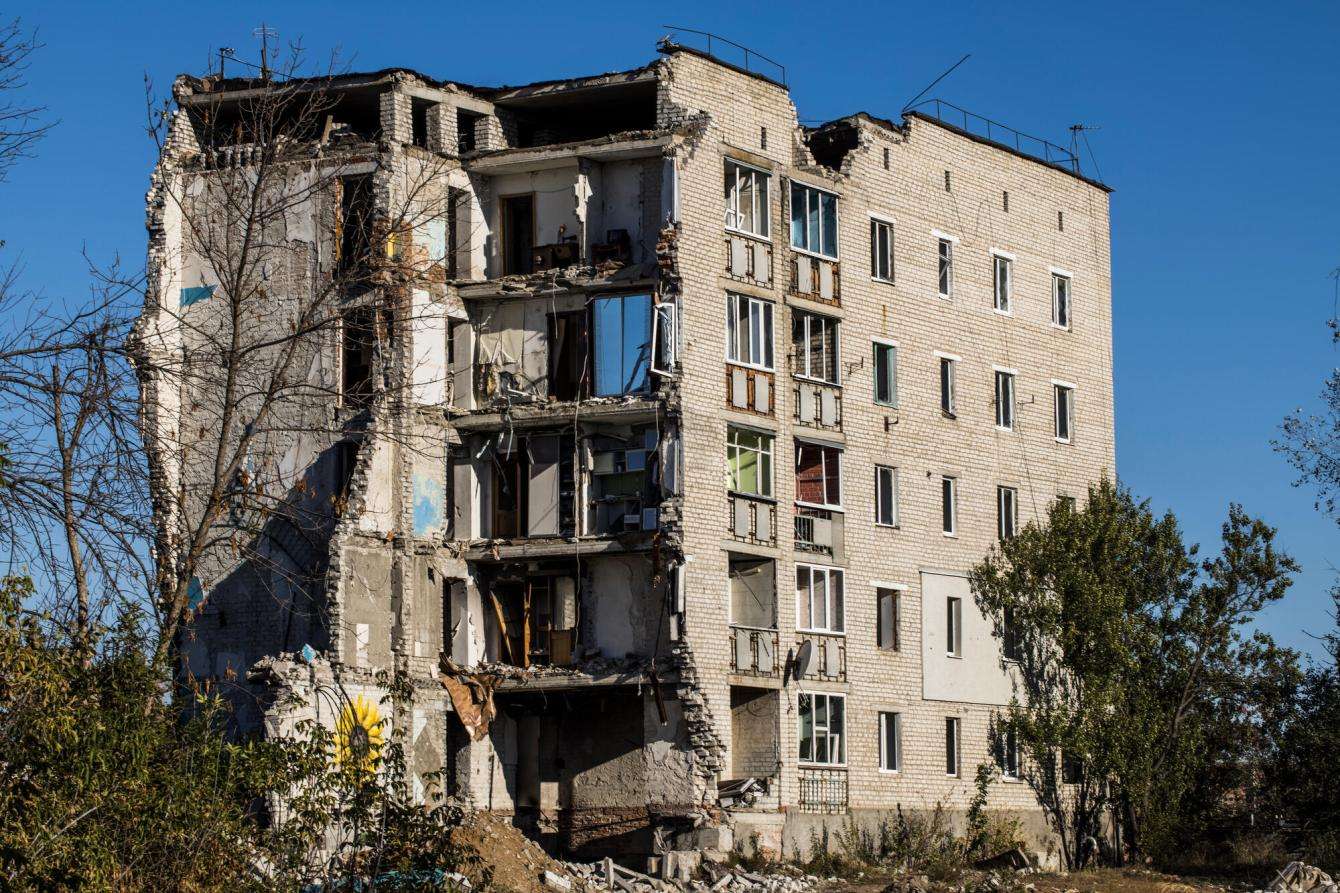
Changing attitudes toward mental health care
Many people are more willing to seek psychological help now than at the start of hostilities in 2014. Before the full-scale invasion in 2022, mental health consultations were not common or available for many people in Ukraine. Over the last two years, MSF has contributed to expanding awareness of the importance of seeking mental health support and has made services more available to people so they can find a source of relief. Our patients include children, teenagers, parents, and elderly people, and many have never before been seen by a psychologist.
Due to the advocacy of international, local, and governmental organizations, the stigma around mental health is dissipating. More people are sharing their experiences and emotions, letting tensions go.
More on MSF's health response in Ukraine
Since the start of the full-scale war in Ukraine in February 2022, mental health support has been a key component of MSF’s response. Our mobile clinic teams provide primary health care as well as mental health counseling and psychoeducation. MSF staff render secondary health care training, including psychiatric care, mass casualty response, and mental health training for medical staff. In Vinnytsia, MSF provides psychotherapy and medical services to people with war-related PTSD symptoms. In Cherkasy, mental health is a component of a physiotherapy project for war-wounded and injured patients.
